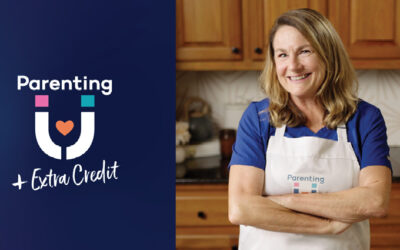Thought you were done with vaccines once your kids passed the toddler stage? Think again!
Just like helping juggle homework assignments and extracurricular activities, keeping up with immunizations is an important part of parenting tweens and teens.
Brett Hutchinson, MD, Board Certified pediatrician who has been with Our Lady of the Lake Children’s Health for more than 16 years, joins us in this episode of ParentingU to talk about all things vaccines for tweens and teens.
“Vaccines are just as important at the preteen and teen years as they were when the child was an infant,” Dr. Hutchinson says. “Why not take the protection that we can get when it’s available?”
Understanding Vaccines and How They Work
During the COVID-19 pandemic, vaccine development was a common topic of conversation. Vaccines protect children and adults from harmful infections.
“Vaccines teach our immune system a little bit about a virus or bacteria then allow our body to recognize it quickly and kill it or get rid of it,” Dr. Hutchinson explains. The vaccines can be created with a killed virus or a live but weakened (or attenuated) virus to stimulate the body’s immune response. This leads to the production of antibodies and developing immunity against the targeted disease.
Modern Miracle of Science
Advancements in vaccine development protect not only individual health but also community well-being. Vaccines have saved countless lives and improved lives by keeping people healthy.
“The first vaccines were for things like diphtheria, which nobody ever gets anymore (in the U.S.),” Dr. Hutchinson says. Vaccines’ success makes it easy to take them for granted.
Including tetanus, polio, rotavirus, chicken pox, measles, mumps and rubella and more, the list of illnesses that routine childhood vaccines prevent is long. Dr. Hutchinson provides a more in-depth look at the development of vaccines over the years in this parents’ primer on vaccines.
Download our guide to Wellness Checks from Newborn to Teenage Years with a complete vaccine schedule designed to know which vaccines your tween or teen can expect at each visit.
Understanding Side Effects
Parents rightly have concerns about vaccines and may worry that getting a vaccine may make their child sick.
“The answer to that is no, you can’t get an illness from the vaccine,” Dr. Hutchinson says. “When you create an immune response to the vaccine, that can mean you feel a little run down or have a little fever, and that’s actually a good sign. It means your body did respond to the vaccine.”
That type of side effect is short-lived and might last a day or two, but it’s not having the illness itself.
From Chickenpox Parties to Shingles Prevention
Chickenpox, a highly contagious airborne disease, affected thousands of children each year before a vaccine was developed in the 1990s. The varicella vaccine has dramatically reduced the incidence of the disease, sparing future generations from the discomfort and potential complications.
Chickenpox parties, where parents would intentionally make sure their child was infected at a younger, safer age, were normal before the vaccine was developed.
Shingles, a painful condition that’s only a risk to people who have had a previous chickenpox infection, may be eliminated thanks to the vaccine.
“Ask any adult who’s had shingles, would you love to have had something done in your childhood that would have kept you form having that experience?” Dr. Hutchinson says. “Unequivocally, the answer would be yes!”
Vaccines Adolescents Need
The key vaccines that preteens and teenagers need include boosters for tetanus, diphtheria and pertussis (Tdap) as well as vaccines targeting meningitis and human papilloma virus (HPV). Schools often require the tetanus booster and meningitis vaccines when entering fifth grade.
The HPV vaccine is nearly 20 years old, and it can prevent the most common sexually transmitted infection in the U.S., which is the cause of most cervical cancers as well as anal, vulvar, vaginal, penile, throat and neck cancers.
“Implementation of the HPV vaccine was to prevent cervical cancer,” Dr. Hutchinson says. “But over time other benefits of the vaccine have been found too.”
While the HPV vaccine was first given just to girls, it’s now recommended both boys and girls receive the vaccine, which truly protects everyone.
“It’s a vaccine to help prevent cancer, and there’s no other vaccine to prevent some forms of cancer,” he says. “This is the only one, and we should absolutely want to take that up.”
Annual Flu Shot
In addition to the regularly scheduled childhood vaccines that extend through adolescence, Dr. Hutchinson also recommends everyone get a flu vaccine each year.
“I always tell people if they get the flu, it’s probably going to last for a week and you’ve got to be prepared that you’re going to feel terrible,” he says. Flu symptoms include feeling achy, fever and bad cough.
“If a child gets the flu, that’s a week of school that’s going to be missed and then has to be made up,” Dr. Hutchinson says. Parents have to stay home and miss work, and taking care of a child sick with the flu makes it highly likely the parent will get sick, too. And a sick adult taking care of a sick child – it’s just bad all around.
“We can help prevent that with a very simple vaccine that’s been used for a long time,” he says. “And you cannot get the flu from the flu vaccine.”
Overcoming Vaccine Anxiety
Some kids may have outgrown their fear of needles, but teens may still be worried about getting these immunizations. Dr. Hutchinson has advice for parents to help prepare their kids and ease those fears, particularly for preteens.
“Give them the opportunity to mentally prepare,” Dr. Hutchinson advises. When faced with a child who is nervous about getting multiple shots, he reminds them it’s been a while since they had vaccines other than a flu shot.
“You don’t remember getting a lot of shots because the last time you did you were 4,” he says. “Once you get that first one, you’re going to realize it’s not that bad and you’re going to be OK.”
Others may be worried about any pain and that they’ll cry. To that, Dr. Hutchinson says, “It’s OK to cry. It’s OK to say that it hurts and not be happy. Mom and Dad can still hold your hand, sit with you and reassure you.”




